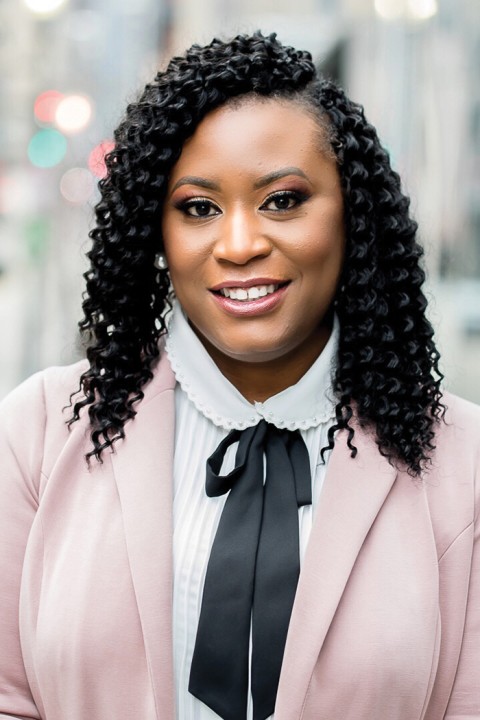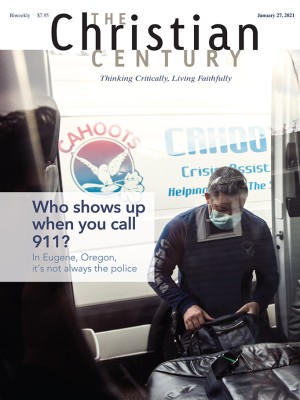The woman behind Pittsburgh’s Demaskus Theater Collective
“The best place to be is at the intersection of art and faith.”

Shaunda Miles McDill, who founded the Pittsburgh-based Demaskus Theater Collective in 2005, embodies a merger between art and faith. Demaskus’s mission is to make known the messages of the marginalized through quality theatrical productions and presentations. Information on productions is at demaskus.com.
How did you come to form Demaskus Theater Collective?
Having studied African and African American studies and theater, and being a person who relished in the study of the Bible, I believe I found the point of intersection with God’s call to “demask us.” I suppose I was always struggling with the truth I knew of the history of enslaved Africans in America, always trying to reconcile that with the freedom we are told we have in Christ.
Read our latest issue or browse back issues.
I remember in college there was a convening called On Golden Pond. The most prolific thinkers and creative cultural workers gathered on Dartmouth’s campus. As I listened to the speeches, I felt like the promises and the hope were always for the future. I remember being in one session and feeling confused about when some of these hopes would come to pass—were we waiting for permission? Or for those in positions of power to “get it”?
Renowned director Clinton Turner Davis was sitting near me. I remember him saying something about “at the crossroads,” and I could hear the cries of “by and by when the morning comes.” Then, and now, I believe that I will see the goodness of the Lord in the land of the living. That goodness is Isaiah 58 in my mind and heart, and those things are capable of being done now, not in the great by and by.
Some of the texts I was wrestling with at that time were Paul Laurence Dunbar’s poem “We Wear the Mask” and Acts 9, when Saul was converted—a straight-up murderer became the person who wrote so much of the New Testament. I was also holding tight to Langston Hughes’s “Note on Commercial Theatre.” I believe God’s call to me was to use my work to let people know that there are places where you can access God directly: there is no veil, no mask, and even with regard to race in America, my freedom is not predicated upon the laws and rules of those who hold fast to supremacy.
When I left work at Cornerstone Theater Company and decided I would pursue the theater collective and seminary, the theater collective work stuck—I have yet to finish seminary, even after studying in a few places. Over time, I realized that the message of the gospel was palatable neither among Christians nor among most theater people I was working alongside (many of whom were preacher’s kids, ironically.) So, while it was a lonely place, I realized I was probably in the sweet spot. I eventually came to the mission of “making known the messages of the marginalized.”
The collective of artists I have worked with, some intermittently over 15-plus years, are simply creative friends who know they have an artistic home—a place where they can come to sharpen skills, to take risks, to fly or fail. I get to strive to be my best self in the work, and that simply means the best servant I can be. That’s Demaskus.
You did not select the traditional spelling of “Damascus.” Why “Demaskus”?
It is the notion that I will not wear a mask. I also will not go through man to get to God, because there is no longer a veil. Just as it was torn, the tearing off of this mask or this notion that our double consciousness means we are living a lie instead of with great, God-given wisdom and incredible insight—this is why the company’s name is Demaskus. It is a cry, a call.
How has your Christianity informed your theater work?
My Christianity—my walk with God and my growth in my knowledge and relationship—is the center of who I am. When I am in good relationship, I am my most creative. I think I recently came to the realization that the first Creator is with me as I create, and in that act of creating, I am worshiping. For actors and artists depending on others for their content, this can be difficult to live with. But as I select what to work on and what I will not work on, I believe it is all deeply rooted in God—and that means it must be rooted in love.
Theater that is not about helping people to love themselves, others, and all that God has created with more vigor and zest and authenticity is not of interest to me. That may look like many different things, and some people may not agree with some of the decisions, but maybe that is why I continue to work in the field of the theater and have not landed long-term in an occupation in a traditional church (even when at times I tried really hard to).
Do you have any advice for creative people who may, for whatever reason, feel torn between their art and their faith?
God is not opposed to our creativity. God is the author of both your faith and your innovation. Everything we need to overcome our writer’s block, our burnout, our unanswered questions about our character’s arc can be found in our relationship with the Divine.
When we really want to know the essence and depth of something, we have to go to the source. Be rooted and guided from there. The failures won’t feel as low, and the achievements won’t lead us to hubris, when Christ is at the center. The best place to be is at the intersection of art and faith. It is a gift and an advantage.
A favorite quote that speaks to this intersection is from John Calvin: “The whole world is a theater for the display of the divine goodness, wisdom, justice, and power, but the Church is the orchestra, as it were—the most conspicuous part of it; and the nearer the approaches are that God makes to us, the more intimate and condescending the communication of his benefits, the more attentively are we called to consider them.”
A version of this article appears in the print edition under the title “Faith meets art in the theater.”





